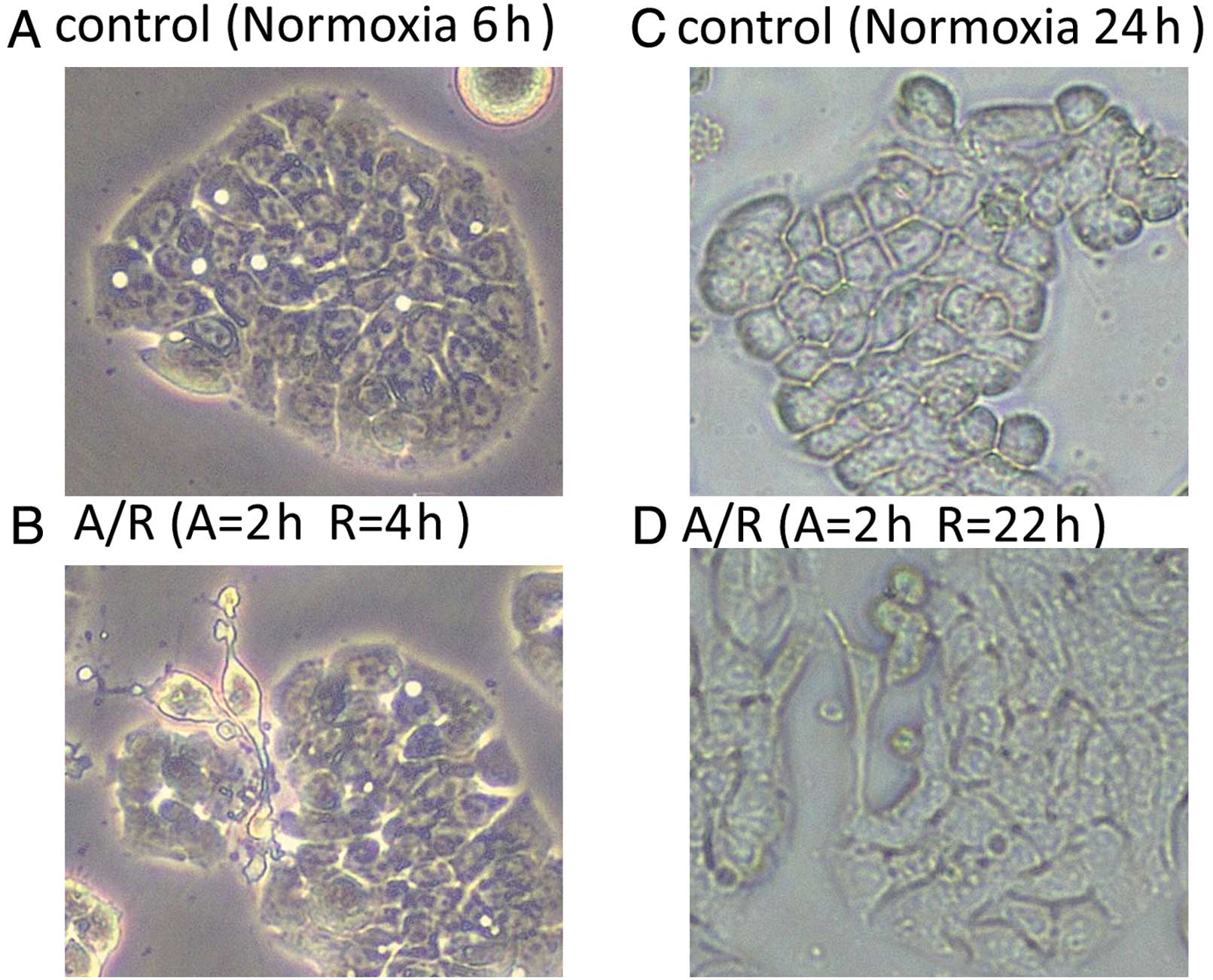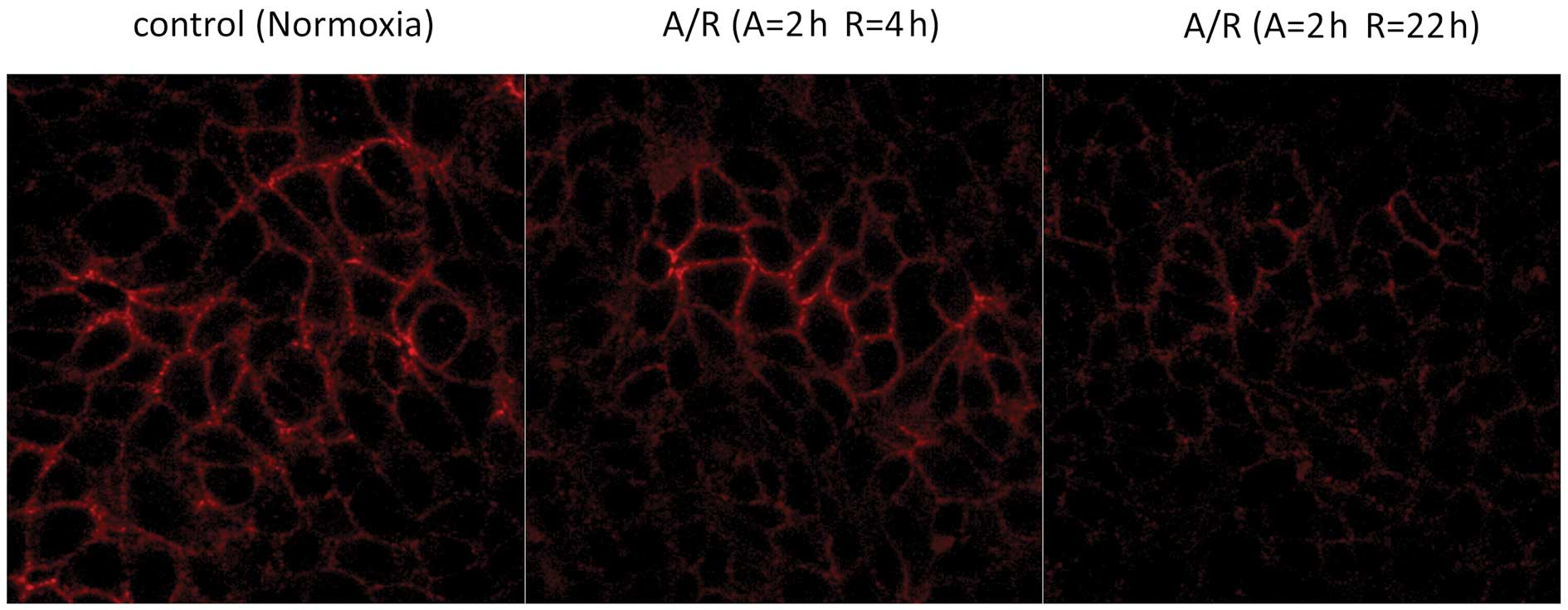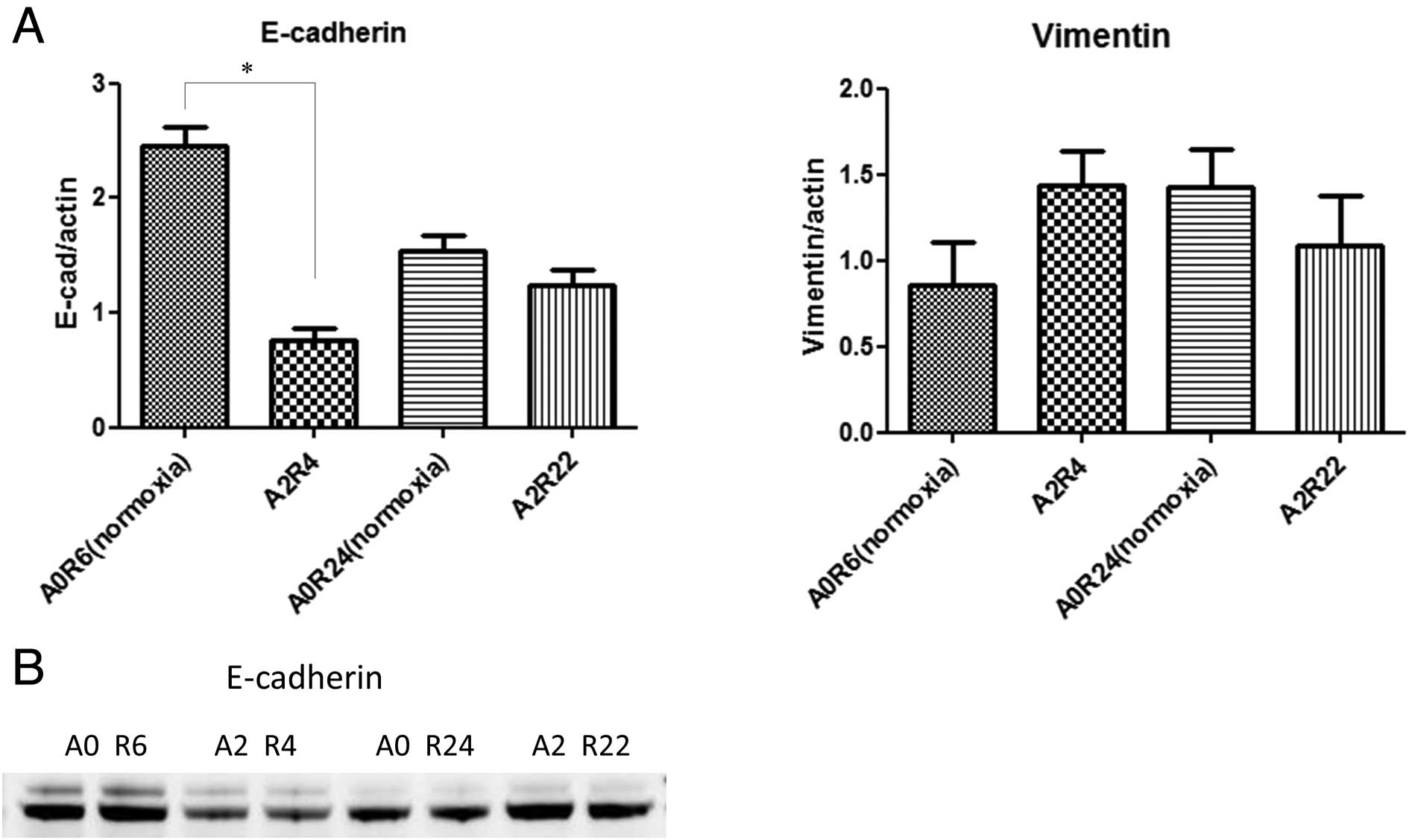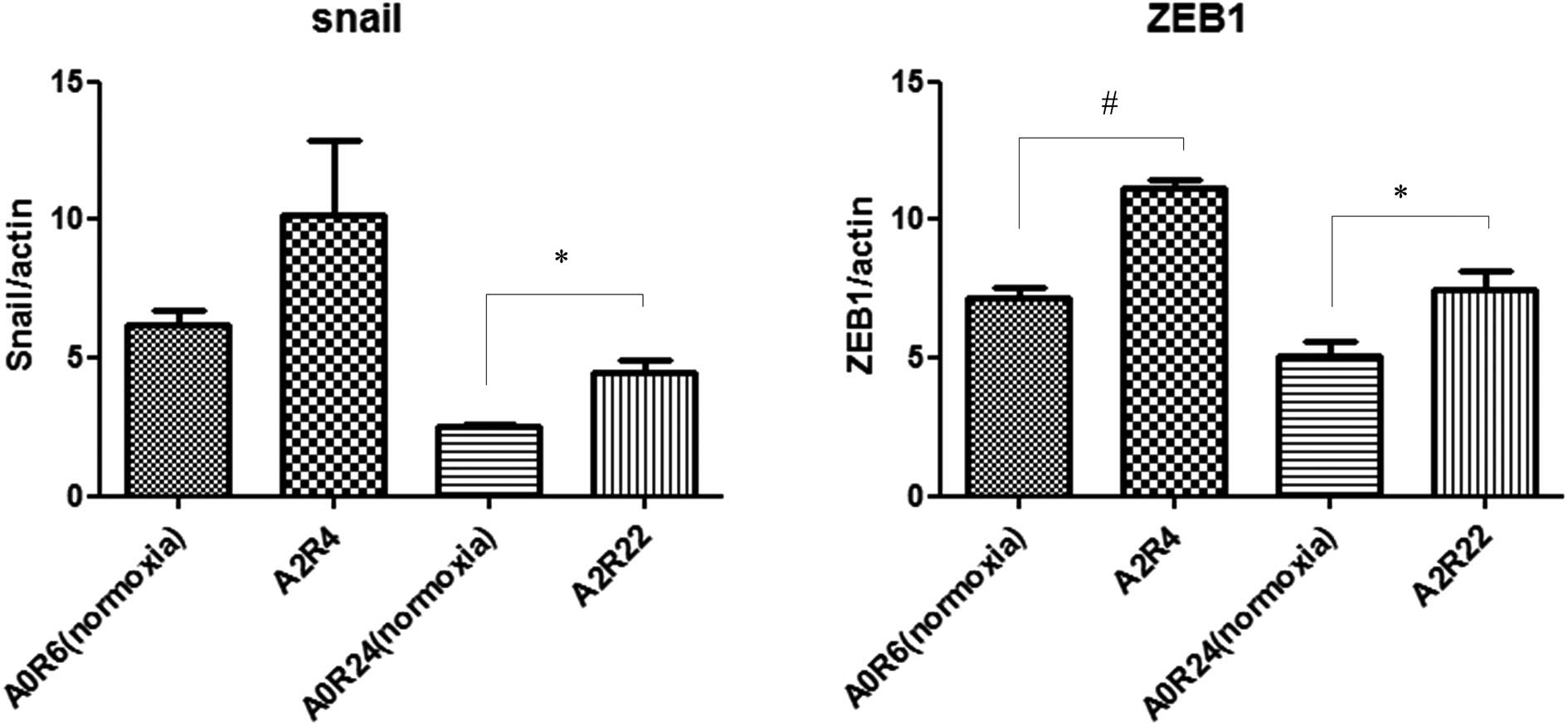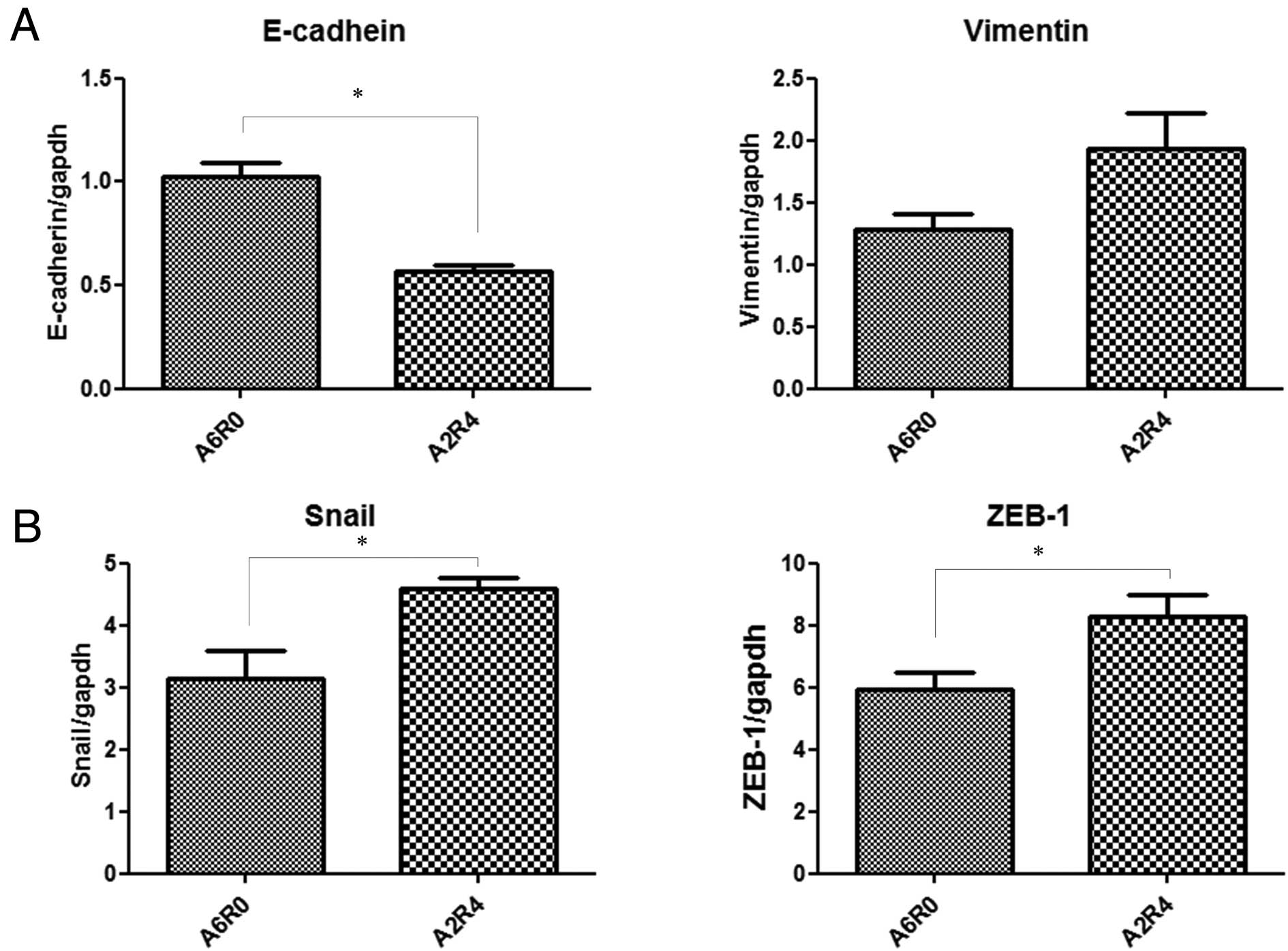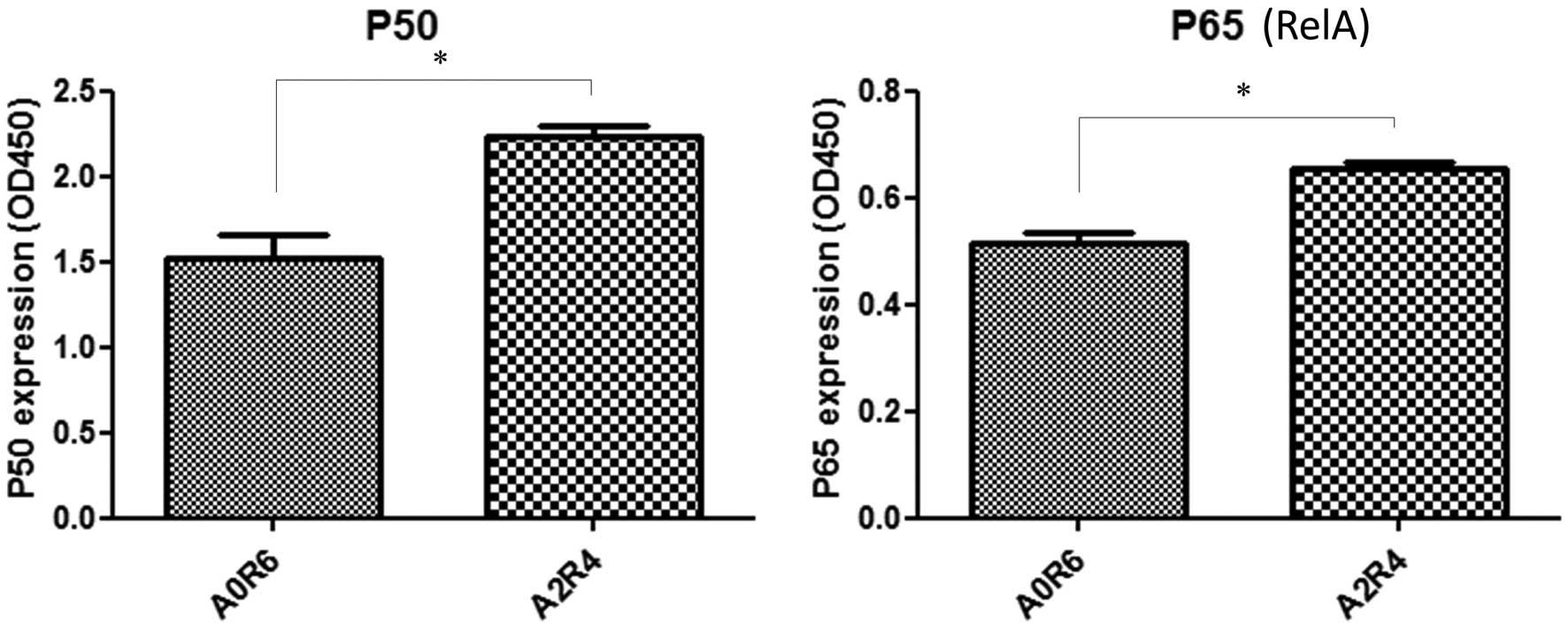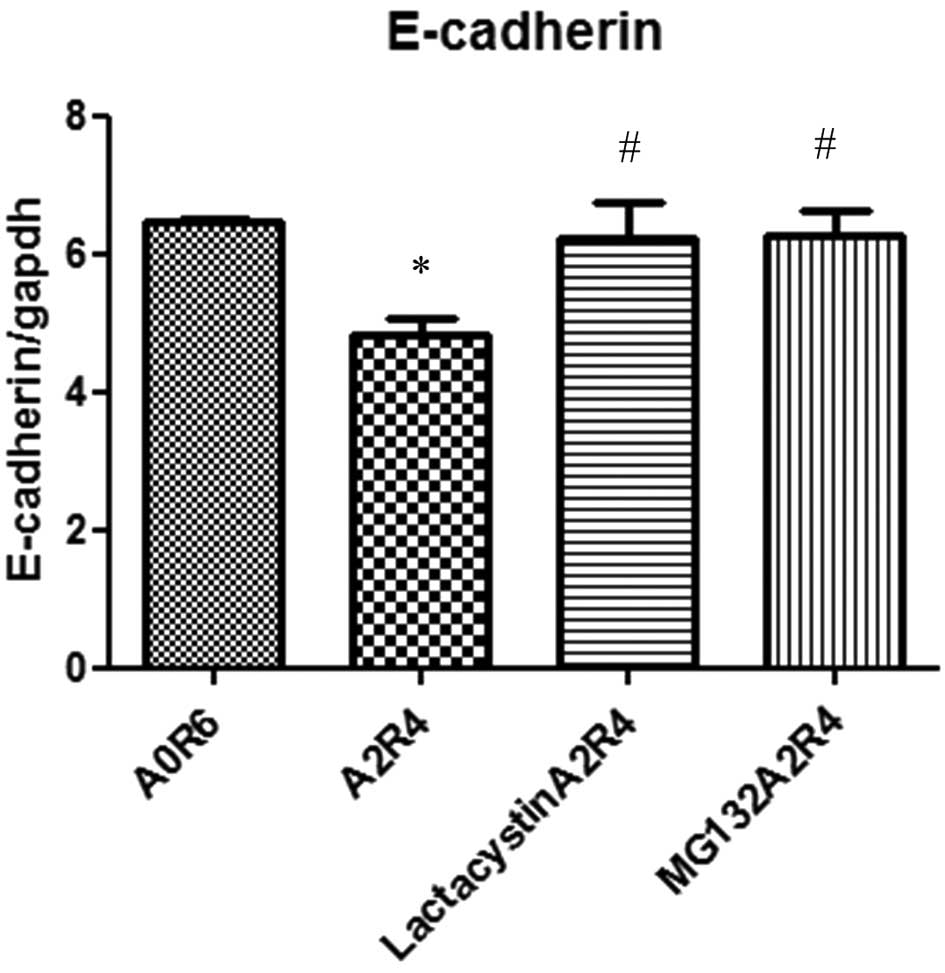|
1
|
Greenburg G and Hay ED: Epithelia
suspended in collagen gels can lose polarity and express
characteristics of migrating mesenchymal cells. J Cell Biol.
95:333–339. 1982. View Article : Google Scholar : PubMed/NCBI
|
|
2
|
Kalluri R and Weinberg RA: The basics of
epithelial-mesenchymal transition. J Clin Invest. 119:1420–1428.
2009. View
Article : Google Scholar : PubMed/NCBI
|
|
3
|
Spaderna S, Schmalhofer O, Hlubek F, Berx
G, Eqer A, Merkel S, et al: A transient, EMT-linked loss of
basement membranes indicates metastasis and poor survival in
colorectal cancer. Gastroenterology. 131:830–840. 2006. View Article : Google Scholar : PubMed/NCBI
|
|
4
|
Hugo H, Ackland ML, Blick T, Lawrence MG,
Clements JA, Williams ED, et al: Epithelial-mesenchymal and
mesenchymal-epithelial transitions in carcinoma progression. J Cell
Physiol. 213:374–383. 2007. View Article : Google Scholar : PubMed/NCBI
|
|
5
|
Min C, Eddy SF, Sherr DH and Sonenshein
GE: NF-κB and epithelial to mesenchymal transition of cancer. J
Cell Biochem. 104:733–744. 2008.
|
|
6
|
Wang Y and Zhou BP: Epithelial-mesenchymal
transition in breast cancer progression and metastasis. Chin J
Cancer. 30:603–611. 2011. View Article : Google Scholar : PubMed/NCBI
|
|
7
|
Jouppila-Mättö A, Närkiö-Mäkelä M, Soini
Y, Pukkila M, Sironen R, Tuhkanen H, et al: Twist and snai1
expression in pharyngeal squamous cell carcinoma stroma is related
to cancer progression. BMC Cancer. 11:3502011.PubMed/NCBI
|
|
8
|
Okunieff P, Fenton B and Chen Y: Past,
present, and future of oxygen in cancer research. Adv Exp Med Biol.
566:213–222. 2005. View Article : Google Scholar : PubMed/NCBI
|
|
9
|
Vaupel P, Schlenqer K, Knoop C and Hockel
M: Oxygenation of human tumors: evaluation of tissue oxygen
distribution in breast cancers by computerized O2
tension measurements. Cancer Res. 51:3316–3322. 1991.PubMed/NCBI
|
|
10
|
Fokas E, McKenna WG and Muschel RJ: The
impact of tumor microenvironment on cancer treatment and its
modulation by direct and indirect antivascular strategies. Cancer
Metastasis Rev. 31:823–842. 2012. View Article : Google Scholar : PubMed/NCBI
|
|
11
|
Maqat J, Jordan BF, Cron GO and Gallez B:
Noninvasive mapping of spontaneous fluctuations in tumor
oxygenation using 19F MRI. Med Phys. 37:5434–5441. 2010.
View Article : Google Scholar : PubMed/NCBI
|
|
12
|
Morgan MJ and Liu ZG: Crosstalk of
reactive oxygen species and NF-κB signaling. Cell Res. 21:103–115.
2011.
|
|
13
|
Rofstad EK: Microenvironment-induced
cancer metastasis. Int J Radiat Biol. 76:589–605. 2000. View Article : Google Scholar : PubMed/NCBI
|
|
14
|
Binker MG, Binker-Cosen AA, Richards D,
Gaisano HY, de Cosen RH and Cosen-Binker LI: Hypoxia-reoxygenation
increase invasiveness of PANC-1 cells through Rac1/MMP-2. Biochem
Biophys Res Commun. 393:371–376. 2010. View Article : Google Scholar : PubMed/NCBI
|
|
15
|
Nicould IB, Jones CM, Pierce JM, Earl TM,
Matrisian LM, Chari RS, et al: Warm hepatic ischemia-reperfusion
promotes growth of colorectal carcinoma micrometastases in mouse
liver via matrix metalloproteinase-9 induction. Cancer Res.
67:2720–2728. 2007. View Article : Google Scholar
|
|
16
|
Man K, Nq KT, Lo CM, Ho JW, Sun BS, Sun
CK, et al: Ischemia-reperfusion of small liver remnant promotes
liver tumor growth and metastases - activation of cell invasion and
migration pathways. Liver Transpl. 13:1669–1677. 2007. View Article : Google Scholar : PubMed/NCBI
|
|
17
|
Kokura S, Yoshida N, Imamoto E, Ueda M,
Ishikawa T, Uchiyama K, Kuchide M, Naito Y, Okanoue T and Yoshikawa
T: Anoxia reoxygenation down-regulates the expression of E-cadherin
in human colon cancer cell lines. Cancer Lett. 211:79–87. 2004.
View Article : Google Scholar : PubMed/NCBI
|
|
18
|
Teicher BA: Hypoxia and drug resistance.
Cancer Metastasis Rev. 13:139–168. 1994. View Article : Google Scholar
|
|
19
|
Martinive P, Defresne F, Bouzin C, Saliez
J, Lair F, Grégoire V, et al: Preconditioning of the tumor
vasculature and tumor cells by intermittent hypoxia: implications
for anticancer therapies. Cancer Res. 66:11736–11744. 2006.
View Article : Google Scholar : PubMed/NCBI
|
|
20
|
Cairns RA, Kalliomaki T and Hill RP: Acute
(cyclic) hypoxia enhances spontaneous metastasis of KHT murine
tumors. Cancer Res. 61:8903–8908. 2001.PubMed/NCBI
|
|
21
|
Jing Y, Han Z, Zhang S, Liu Y and Wei L:
Epithelial-mesenchymal transition in tumor microenvironment. Cell
Biosci. 1:292011. View Article : Google Scholar : PubMed/NCBI
|
|
22
|
Thiery JP: Epithelial-mesenchymal
transitions in tumor progression. Nat Rev Cancer. 2:442–454. 2002.
View Article : Google Scholar : PubMed/NCBI
|
|
23
|
Lee MY and Shen MR: Epithelial-mesenchymal
transition in cervical carcinoma. Am J Transl Res. 4:1–13.
2012.PubMed/NCBI
|
|
24
|
Shi Y and Massagué J: Mechanisms of
TGF-beta signaling from cell membrane to the nucleus. Cell.
113:685–700. 2003. View Article : Google Scholar : PubMed/NCBI
|
|
25
|
Medici D, Hay ED and Olsen BR: Snail and
Slug promote epithelial-mesenchymal transition through
beta-catenin-T-cell factor-4-dependent expression of transforming
growth factor-beta3. Mol Biol Cell. 19:4875–4887. 2008. View Article : Google Scholar : PubMed/NCBI
|
|
26
|
Bachelder RE, Yoon SO, Franci C, de
Herreros AG and Mercurio AM: Glycogen synthase kinase-3 is an
endogenous inhibitor of Snail transcription: implications for the
epithelial-mesenchymal transition. J Cell Biol. 168:29–33. 2005.
View Article : Google Scholar
|
|
27
|
Chua HL, Bhat-Nakshatri P, Clare SE,
Morimiya A, Badve S and Nakashatri H: NF-kappaB represses
E-cadherin expression and enhances epithelial to mesenchymal
transition of mammary epithelial cells: potential involvement of
ZEB-1 and ZEB-2. Oncogene. 26:711–724. 2007. View Article : Google Scholar
|
|
28
|
Takeda K, Takeuchi O, Tsujimura T, Itami
S, Adachi O, Kawai T, et al: Limb and skin abnormalities in mice
lacking IKKalpha. Science. 284:313–316. 1999. View Article : Google Scholar : PubMed/NCBI
|
|
29
|
Rupec RA and Baeuerle PA: The genomic
response of tumor cells to hypoxia and reoxygenation. Differential
activation of transcription factors AP-1 and NF-kappa B. Eur J
Biochem. 234:632–640. 1995. View Article : Google Scholar : PubMed/NCBI
|
|
30
|
Cheng ZX, Sun B, Wang SJ, Gao Y, Zhang YM,
Zhou HX, et al: Nuclear factor-κB-dependent epithelial to
mesenchymal transition induced by HIF-1α activation in pancreatic
cancer cells under hypoxic conditions. PLoS One. 6:e237522011.
|
|
31
|
Shi J, Wan Y and Di W: Effect of hypoxia
and re-oxygenation on cell invasion and adhesion in human ovarian
carcinoma cells. Oncol Rep. 20:803–807. 2008.PubMed/NCBI
|
|
32
|
Cannito S, Novo E and Compaqnone A: Redox
mechanisms switch on hypoxia-dependent epithelial-mesenchymal
transition in cancer cells. Carcinogenesis. 29:2267–2278. 2008.
View Article : Google Scholar : PubMed/NCBI
|
|
33
|
Rofstad EK, Galappathi K, Mathiesen B and
Ruud EB: Fluctuating and diffusion-limited hypoxia-induced
metastasis. Clin Cancer Res. 13:1971–1978. 2007. View Article : Google Scholar : PubMed/NCBI
|















